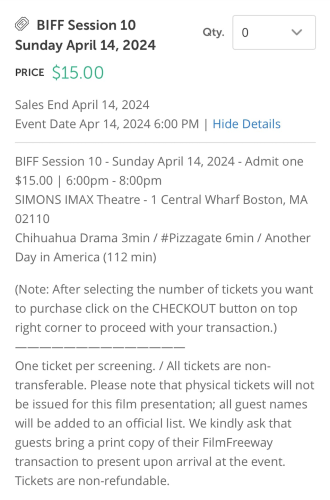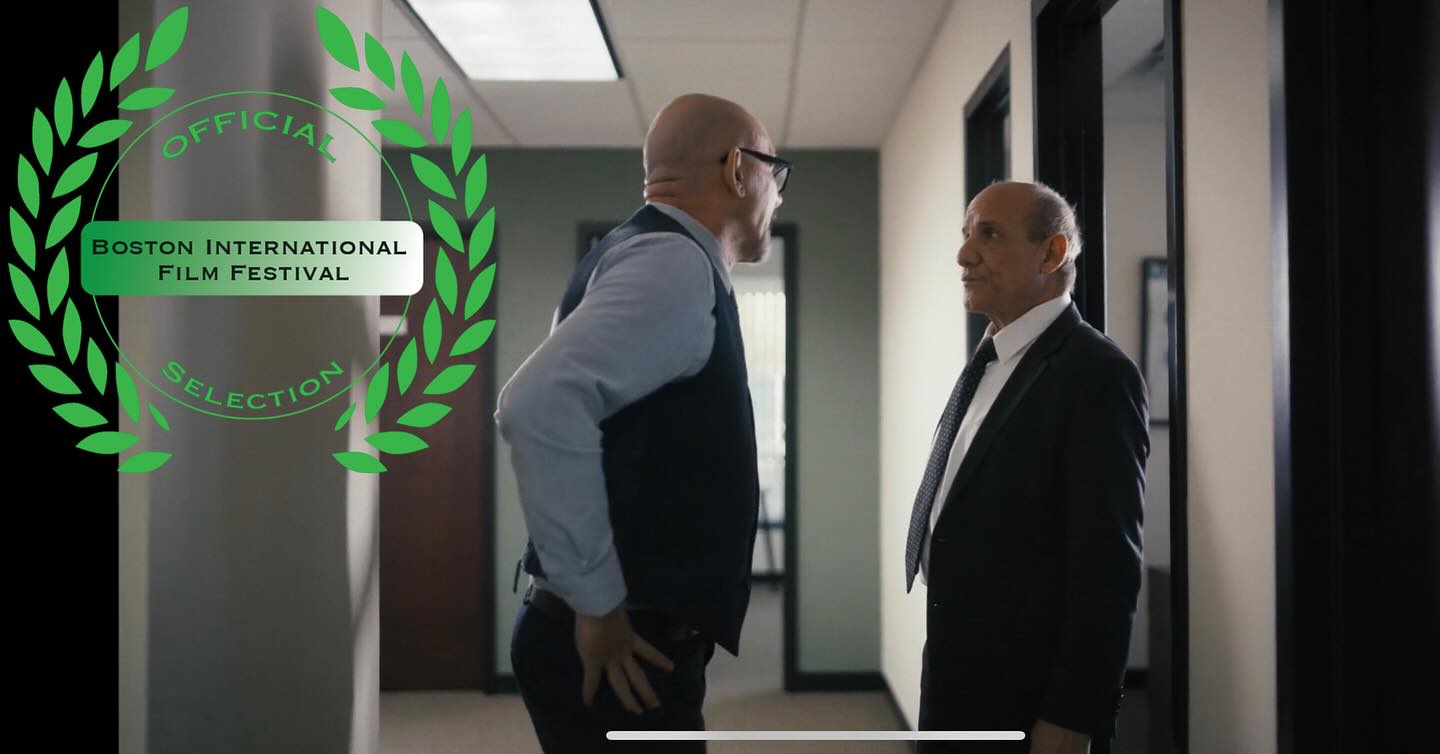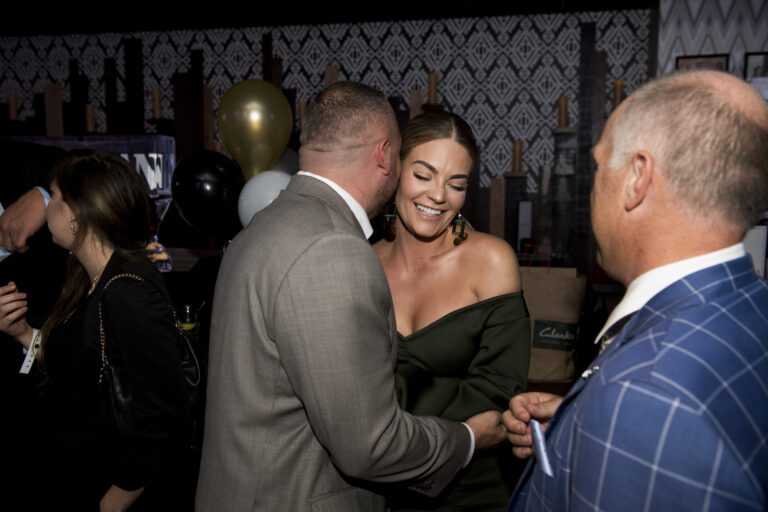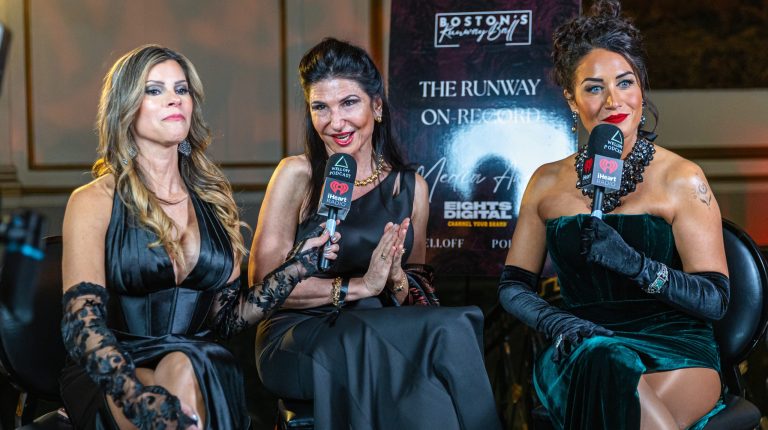Emilio Mauro has experienced the highs and lows of Hollywood throughout his career as a talented script writer, movie producer, and director. With his latest film, Another Day in America, the North Shore native is poised to begin his best run yet in the entertainment industry.
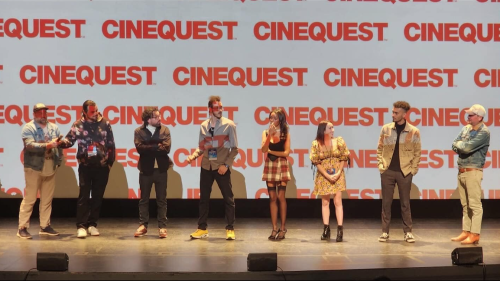
IT’s just before 2pm on Saturday March 9th. Emilio Mauro is slightly fidgeting in his seat, sipping a soft drink, while alternating glances from the influx of messages coming through on his cell phone to the giant 60 foot screen in front of him at the Hammer Theatre Center in San Jose, CA.
In a few moments his latest effort, Another Day in America, will be debuting at The Cinequest Film Fesitval -voted by USA Today readers as the best film festival in the country- and the jam packed theatre is buzzing in anticipation.
“It’s been quite the journey,” Emilio says softly to no one in particular, perhaps only to himself. “I almost didn’t make it here. I almost didn’t make this movie.”
Another Day in America debuted at Cinequest one month before its hometown premiere at The Boston Film Festival on April 14th.
But for the Reading, MA native this day and this film is much more than just another day in the life of Emilio Mauro. It marks a monumental milestone in what has been a long and arduous journey to a feature film debut.
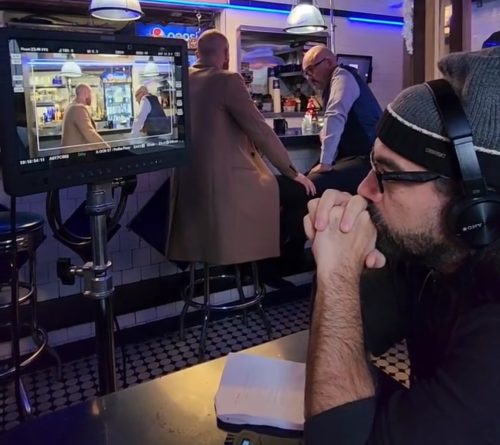
“IN high school the only thing I really enjoyed was movies/television and sports,” Emilio states. “So I decided to take filmmaking workshops. I loved it, but after college I decided to pivot, leaving that world behind at the time, and went into the finance and real estate industry.”
While the process of building portfolios and securing property deals was fueling an adrenaline rush for many of his contemporaries, it wasn’t quite the tingle Emilio was looking -or needed- in his own life.
“It wasn’t my true calling,” he explains. “I missed the art of storytelling.”
So he got back to writing.
In 2007, Emilio saw some initial success with a script he co-wrote with a former firefighter, Michael Yebba called The Fallen.
A quasi biopic on Yebba’s life, the would-be film received nationwide attention, with Hollywood legend Penny Marshall even throwing her hat into the ring to be involved.
“Even though, on the surface, it seemed like a success; we had this Hollywood experience and were meeting all of these amazing people,” says Emilio. “It was all a little fake.”
Despite discussions of a $5-10 million production deal, the script ultimately wasn’t made into a movie.
After experiencing what he calls “the euphoric highs and tragic lows of Hollywood” with The Fallen, Emilio continued to write, determined to create his breakthrough film.
In 2014, a rewritten version from of one of Emilio’s scripts was produced into the gritty Boston cult classic film By The Gun, starring Ben Barnes, Leighton Leester, Toby Jones and Harvey Keitel.
However, the indie crime drama turned out to be even more dramatic behind the scenes, with funding issues and extreme script rewrites.
“My original story centered around the fall of the traditional Italian American family with crime elements only being used as a backdrop,” states Emilio. “But the film was rewritten to become more of a gangster movie.”
Emilio partnered with “a trusted filmmaker, who is still a close friend” but says once the vision was slightly altered “it wasn’t mine any longer and as an artist, the implementation of your creative is what you want.”
Nevertheless, it debuted in September (2014) at the Zurich Film Festival before its theatrical release that December, and to this day remains a staple among independent Boston based movies.
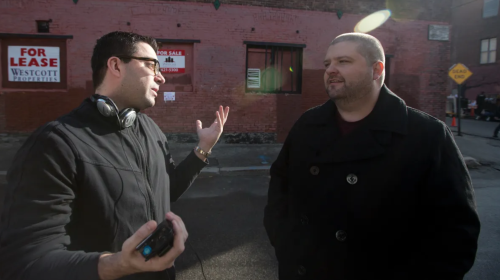
Shortly thereafter another script he wrote with Yebba, Affair of Honor, caught the eye of high-profile producers at FOX, and the showrunner Emilio was working with had meetings with the broadcast giant to discuss purchasing its rights with hopes of it being turned into a television series.
It felt like his career was finally primed and ready for liftoff.
“I remember finally thinking, okay, this is how it is supposed to be,” recalls Emilio. “Big agency meetings, big pitch presentations; there was some genuine interest.”
Unfortunately, The Middle Man (the name floated for the tv series) was eventually shelved by Fox.
Both mentally and physically fatigued by the process though, Emilio decided to take a step away from the creative aspects of the business once more. The rollercoaster ride, he says, seemed to have far more downs than ups, and the whole undertaking was beginning to feel what he describes as ‘the same old Hollywood bullshit.’
When he did put pen to paper, he rarely shared his work with anyone during this time. And when he did poke his head back out, he was “met with the same concoction of lies, smoke, and mirrors.”
No matter how dejected he would get though, the passion and love for the art of storytelling never left him.
“In that time, I mainly supported other writers and creatives, and tried to believe part of that journey,” Emilio admits.
“It can be difficult to live the life of an indie filmmaker, and I know the benefit of surrounding yourself with good, honest people; so I tried to be that person for others.”
Back behind a desk working mid-office finance deals, Emilio was practically squeezed out of the filmmaking industry altogether in 2020 when the worldwide Covid-19 pandemic hit.
“Like most indie guys, COVID put a halt on everything,” he says. “The pandemic decimated indie films. For nine months, I sat behind a backlog of movies; all the films I was trying to produce at the time were practically dead.”
After almost a year of sitting and waiting, Emilio literally grew restless:
“It was December 31st, 2020, around 8 pm,” he begins. “I’m sick in bed with COVID, but I wanted to remember my New Year’s Eve. So, I decided to write this script which had been in my head for ten years.”
Emilio hadn’t seriously written anything in a couple of years, but he knew this was something he wanted to do. He needed to do.
“Above all else, I wanted to write something makable, something simple, but loosely based on actual events,” he explains. “I knew I wanted a movie to be set around one day in an American office.”
Even though the script had been inside Emilio’s head for the best part of a decade, he was hit with writer’s block (or was it COVID?) as soon as he came face to face with the first blank page.
“I couldn’t write it. It was as simple as that,” he exclaims. “After staring at the page for hours, without writing a single word, the only thing that finally came to me was the damn title.”
Another Day In America.
But as it turns out, that’s all he needed. The title was the spark, and then the words started pouring on to the pages. His pen and hand could barely keep up with his thoughts, his script, his vision.
Fifty pages of dialogue later, he looked up at the clock.
“I was shocked to see it was 5 am. I had blown through the New Year, and it felt like a snap,” he says. “When I’m in that zone, I black out, channel it, and experience it. It’s like a dream.”
Two weeks later, after working, re-working and going through several of his own tweaks and revisions, Emilio had a shareable draft. His first in years.
Although well-received out of the gate by most, he says, the general feedback of Another Day In America was consistent: ‘you can’t say this’ and ‘you can’t do that’.
Familiar problems began resurfacing, the same ones that caused Emilio to take his hiatus a few years earlier.
The creativity work came in the form of a ‘gangster film,’ that wasn’t his script.
The Fox TV series that suffered under the heavy weight of rewrites.
For Emilio, it was beginning to sound a little too much like roads past traveled. So in the midst of the pushback, and some producers wanting to turn it into a ‘bigger film’, he decided to take the plunge; or perhaps in this case, NOT take the plunge.
“I decided I didn’t want to make that bigger film,” he explains. “I had a vision; I just had to make this. I hadn’t written it with me as the director in mind, but I now realized that I had to direct it and find the belief in myself.”
He continues: “There was some resistance to the tone of the film, which is to believe anything less than what laid out would go against what I believe the script needed.”
A true artist, a true storyteller is always evolving. The greatest lessons told are often through those that write them. Emilio has learned many lessons, and he is not afraid to share them through his work.
“Divisiveness is part of the art of film,” he theorizes. “It’s unintentional and intentional – in that it comes through naturally. Attempts were made to change that (with Another Day in America) and I couldn’t accept it. People like changing things in Hollywood and I didn’t want that to happen again. I wanted to live or die by my words and vision. At the end of the day, regardless of what happens, I could live with those circumstances.”
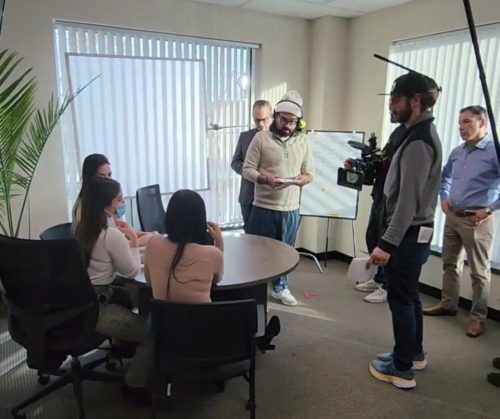
And with that, Emilio decided to make the film himself.
He received initial investment from a handful of “very close friends” whom he trusted. Friends Emilio knew believed in him and the project and -and most importantly- wouldn’t try and alter his vision.
Soon thereafter, he handpicked a host of talented actors -among them Alexis Knapp (Pitch Perfect), Ritchie Coster (Tulsa King, The Dark Knight), Paul BenVictor (The Wire, Pam & Tommy), Natasha Henstridge (Species, The Whole Nine Yards), and Oliver Trevena (Plane, The Bricklayer)- who similarly trusted in the vision.
“Directing the film felt as natural as writing it,” he says. “I love it! Its the best creative decision I ever made!”
Another Day in America, based on true events, is a dark, radical comedy-drama that revolves around an ensemble of distinct characters as they each make their way through a post-pandemic day in an American office.
It’s not business as usual, however, it’s personal. It’s cultural guerrilla warfare, navigating the pains of disenfranchisement, misogyny, racism, perversion, and mental illness.
They are each at a tipping point, making things even more painful, damaging, and dangerous -to themselves, and to each other.
Another Day in America focuses on its polarized society, fueled by the modern day dependence of online internet culture. A culture that is quickly changing yet is anchored by a profoundly violent and painful history.
“It’s a very divisive film,” Emilio admits. “That’s part of the experience. When you make a movie called Another Day in America that’s par for the course.”
The age of social media has simultaneously knocked down and built up so many communication barriers. Still, we remain in an age of misogyny, racism, marginalization, perversion, and prejudice, which Emilio tackles head on -in the familiar setting of an American office.
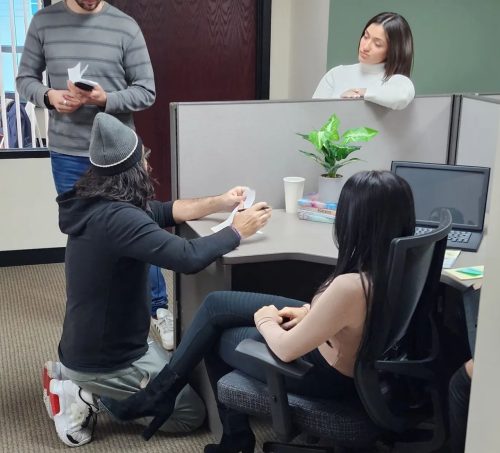
“This is a contemporary story; today’s social and cultural commentary is dominated by internet content found on social media, and it’s happening in real-time,” he says. “I wanted to pierce into this programming and have a film that captures the zeitgeist. So, my approach was to take risks, break some rules, not hold back, and not pull punches.”
Things Emilio learned from past ordeals he would not have been able to do had he gone down the path of the ‘same old Hollywood bullshit’ again.
“Ultimately,I did exactly what I wanted to achieve with my film. Its verisimilitude is biting. I wanted to make a contemporary movie with the DNA of the indie films of the 90s. I wanted to make a film that doesn’t end at the credits but extends into the parking lot or onto the couch with your friends or on social media. If one million people watch this, I want one million different points of view. The audience matters. We are a tribal civilization, but we own our belief system, we own our morality.”
Another Day in America is a throwback to the great movies of the 90’s, Emilio says. He cites American Beauty, Reservoir Dogs, and Chasing Amy as three films that never backed down from their vision. Something he feels Another Day in America, also achieves.
“The language is harsh, and the tone is often shocking while simultaneously being funny and liberating,” he explains. “This film is about the actors and letting them challenge themselves to tell an authentic and complex story; one that digs deep into our culture and moments in history. I wrote blunt, honest, and challenging dialogue that doesn’t pull any punches.”
With the likes of TikTok, YouTube shorts, and Instagram Reels dominating the screens of a new generation, attention spans have been programmed to be at an all-time low.
To counter this, Emilio has crafted a Mamet-esque narrative, telling a story on one day, in one location with hopes of “regaining and capturing a lost audience glued to their TikTok or favorite podcast.”
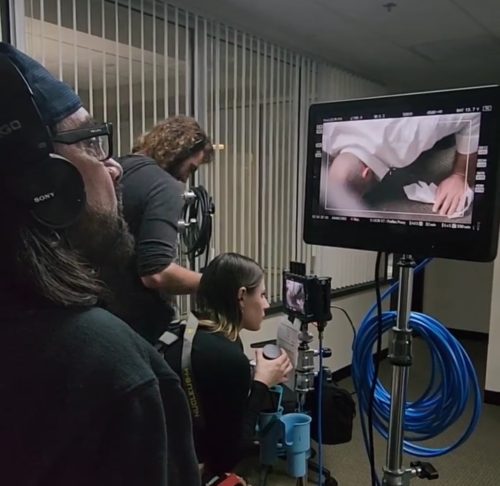
THE lights darken and the movie-goers who have filled The Hammer Theatre let out a cheer of excitement. The opening credits for Another Day in America are about to scroll across the screen. The moment is here.
“Cinquest is the start of the final leg of this journey for this radical little film,” Emilio says. “It made it. We made it.”
Even as Another Day in America debuts, Emilio isn’t ready to take a break. He’s done with taking breaks, for now.
He is already working on producing a script called United States of America vs Bill Gates, which was previously blacklisted back in 2018.
He has a detective script he wrote called Unsolved he hopes to direct in the near future.
There is also a TV show called The Mortgage Game, revolving around the rise and crash of the real estate and mortgage industry told from the street level, which he plans to film in Boston this year.
It’s safe to say, although slightly dormant for a few years, the passion for the art of storytelling is back and as alive as ever in Emilio Mauro.
“We all struggle, we all have our ups and downs,” he shrugs. “For me, the fire is back. I’m ready.”
But hey, that’s just another day in America.
